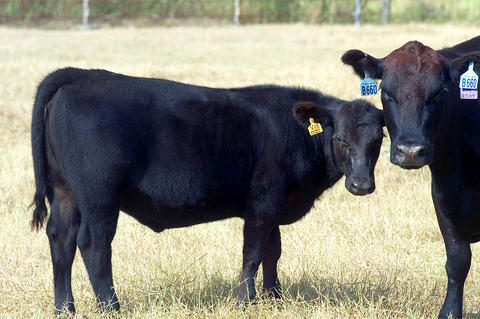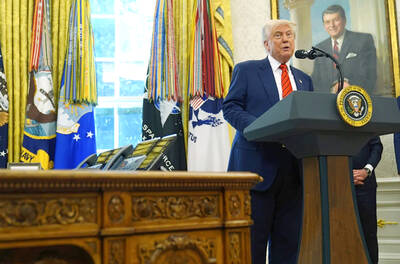US farmers have been given the green light to produce cloned meat for the human food chain. In a 968 page report billed as a "final risk assessment" of the technology, the US Food and Drug Administration has concluded that healthy cloned animals and products from them such as milk are safe for consumers.
Although the announcement in effect removes the final regulatory barrier to selling cloned meat in the US it is likely to be years before meat from cloned animals or their progeny is sold in stores.
The announcement follows the launch of a public consultation on the issue by the European Food Safety Authority. Its "draft opinion" on the technology gave provisional backing on the grounds that there was no evidence for food safety or environmental concerns.

PHOTO: AP
"No differences exceeding the normal variability have been observed in the composition and nutritional value of meat and milk between healthy clones or the progeny of clones and their conventional counterpart," the report said.
It did, though, highlight animal welfare concerns.
Scientists stress that cloning will not be used to create herds of identical animals that are themselves destined for the dinner plate. Rather it will be used as a breeding tool to create high-value breeding animals with desirable traits such as disease resistance or a faster growth rate. It is the progeny of clones that could potentially reach dinner plates.
"At this stage, in terms of commercial food production it's not going to be beneficial because it's such an expensive process," said Helen Ferrier, the UK's National Farmers' Union's food science adviser.
The NFU has adopted a wait-and-see attitude to the technology but she added: "Generally our views on the safety or the acceptability, etc, are really based on the opinions of independent scientific experts."
If cloning is adopted, though, she said the NFU did not favour labelling cloned meat.
"If the product is absolutely the same as its equivalent but using a different system it's not necessarily very useful to label it because it's misleading to the consumer and it's impossible to enforce," she said.
Critics of using cloning in agriculture point out that the method used to create identical animals -- essentially the same used to produce Dolly the sheep -- is inefficient, with a significant proportion of embryos not developing to maturity. Even some apparently successful cloned embryos are prone to severe developmental problems after birth. Scientists say the loss rates are coming down as the technology improves.
"It's a technology that has arisen out of a huge burden of animal suffering and that is still going on," said Joyce D'Silva, of Compassion in World Farming.
But she said even if the embryo loss rates were brought down to acceptable levels, the technology would be detrimental to animal welfare.
"It looks like it is going to be used to produce the most highly productive animals -- the cows that produce the most milk, the pigs with the meatiest bodies. These are the high- producing animals that have the most endemic welfare problems anyway," she said.
Scientists counter that cloning can be used to enhance animal welfare, for example by spreading useful genetic mutations that make animals resistant to diseases such as scrapie. Another possible use would be to keep cells on ice from rare breeds that have gone out of fashion.
These cells could be cloned to produce adult animals in future, preserving a genetic heritage which could be used to adapt farm animals to changing climate or new diseases.
The technology could also be used to produce identical replacements for high-value animals such as breeding bulls if they were injured.
D'Silva is concerned that cloned meat could enter the European food chain even if consumers here reject it. Theoretically, that would be illegal because food imported into the UK, for example, must be produced to the same standards as food produced here. However, cloned meat is essentially identical to non-cloned meat, so the rule would be impossible to enforce.
At a briefing on the technology last year, the cloning expert Professor Keith Campbell, of Nottingham University, who was part of the Dolly team, said: "With cloning we can actually collect cells from these animals, store them and bring them back from the dead, so to speak. We can then use them in breeding programs ... It's a way of maintaining rare breeds without having to maintain the animals."

A new online voting system aimed at boosting turnout among the Philippines’ millions of overseas workers ahead of Monday’s mid-term elections has been marked by confusion and fears of disenfranchisement. Thousands of overseas Filipino workers have already cast their ballots in the race dominated by a bitter feud between President Ferdinand Marcos Jr and his impeached vice president, Sara Duterte. While official turnout figures are not yet publicly available, data from the Philippine Commission on Elections (COMELEC) showed that at least 134,000 of the 1.22 million registered overseas voters have signed up for the new online system, which opened on April 13. However,

ALLIES: Calling Putin his ‘old friend,’ Xi said Beijing stood alongside Russia ‘in the face of the international counter-current of unilateralism and hegemonic bullying’ Chinese President Xi Jinping (習近平) yesterday was in Moscow for a state visit ahead of the Kremlin’s grand Victory Day celebrations, as Ukraine accused Russia’s army of launching air strikes just hours into a supposed truce. More than 20 foreign leaders were in Russia to attend a vast military parade today marking 80 years since the defeat of Nazi Germany in World War II, taking place three years into Russia’s offensive in Ukraine. Putin ordered troops into Ukraine in February 2022 and has marshaled the memory of Soviet victory against Nazi Germany to justify his campaign and rally society behind the offensive,

CONFLICTING REPORTS: Beijing said it was ‘not familiar with the matter’ when asked if Chinese jets were used in the conflict, after Pakistan’s foreign minister said they were The Pakistan Army yesterday said it shot down 25 Indian drones, a day after the worst violence between the nuclear-armed rivals in two decades. Pakistani Prime Minister Shehbaz Sharif vowed to retaliate after India launched deadly missile strikes on Wednesday morning, escalating days of gunfire along their border. At least 45 deaths were reported from both sides following Wednesday’s violence, including children. Pakistan’s military said in a statement yesterday that it had “so far shot down 25 Israeli-made Harop drones” at multiple location across the country. “Last night, India showed another act of aggression by sending drones to multiple locations,” Pakistan military spokesman Ahmed

US President Donald Trump on Wednesday said that he would make a decision about how the US government would refer to the body of water commonly known as the Persian Gulf when he visits Arab states next week. Trump told reporters at the White House that he expects his hosts in Saudi Arabia, Qatar and the United Arab Emirates will ask him about the US officially calling the waterway the Arabian Gulf or Gulf of Arabia. “They’re going to ask me about that when I get there, and I’ll have to make a decision,” Trump said. “I don’t want to hurt anybody’s